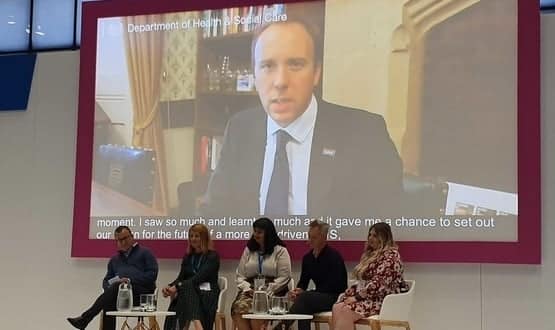CCIO says better infrastructure and training needed to reap benefits of tech
- 5 September 2019

Better infrastructure, access to data and training for the workforce is needed to fully realise the benefits technology can bring in healthcare, a CCIO has said.
Speaking during an NHSX panel discussion at NHS Expo, Ayesha Rahim, CCIO and deputy medical director at Lancashire Care NHS Foundation Trust, said it was easy to get caught up in exciting new technology but getting the basics right was more important.
Talking about her experience in helping other trusts further their digital agenda, she stressed she never heard people say “we need some AI or virtual reality in our service”. Instead, problems remained around simple tasks like logging into systems and secure access to WiFi.
Asked by NHSX chief executive Matthew Gould what her “perfect vision” for the future was, she said: “When I think about the challenges that I see in my day to day practical life, I think of three things: infrastructure, the issues with data and the issues around our workforce.
“Looking at infrastructure, in my role as a deputy medical director I often go to other clinical services and I meet with staff on the ground and I never hear ‘Ayesha, do you know what we need? We need some AI in our service, or some virtual reality in our service’.
“What I hear is ‘It takes 20 minutes to log onto my laptop’ or ‘I can’t connect to the WiFi reliably’ and I see this in my own practice.”
Rahim explained that in her role as a perinatal psychiatrist, she often typed out birth plans with patients sitting beside her, but lengthy login processes often took time away from delivering care.
“Every minute that I spend trying to get into the systems is a minute that I cannot spend listening to what the patients wants,” she told the audience in Manchester.
“That’s not acceptable, we need to get that right.”
Rahim also stressed the important of bringing the entire workforce along on the digital journey.
“If we really want to mainstream clinicians being involved in digital health – not everyone is going to be a CCIO or a CNIO or a CIO – we have a vast array of staff that also need to be involved, because the staff on the ground working know those services best and they will know what works.”
It was a sentiment echoed by Matthew Gould in his opening address, adding that NHSX had to made sure innovation could “flourish”.
“If we want to have a system in which innovation flows and can be safely done and scaled, a system which learns and innovates naturally and happily, then that innovation cannot all come from the centre.
“We have to get away from a mindset in which innovation is driven from above; rather the role of organisations like NHSX has to be to create a platform on which innovation can flourish.
“My sense, increasingly, is the problem is not actually one of innovation it’s one of adoption. We need to create the right platform for innovation and adoption to happen.”
But he warned progress on digitising care will only happen as a result of “genuine partnership” between organisations, clinicians and patients.
“It’ll need us to bring clinicians with us; they need to believe that this is for the best and will help them do their job. We need to bring all the non-clinical staff in the system with us,” Gould said.
“Crucially, we need to make sure patients are with us, that what we design works for them and isn’t just handed to them and are told ‘that’s the answer’. User-centred design is right at the heart of what NHSX is about.”
Read more:
- CCIO says better infrastructure and training needed to reap benefits of tech
- NHS needs ‘trusting’ partnerships with industry to accelerate innovation
- How can we attract more women to CCIO roles?





1 Comments
The 3 Ps. people, processes and products (technology). People are addressed here, technology everywhere, processes zilch. I’m afraid it’s all 3 or imminent failure.
Comments are closed.